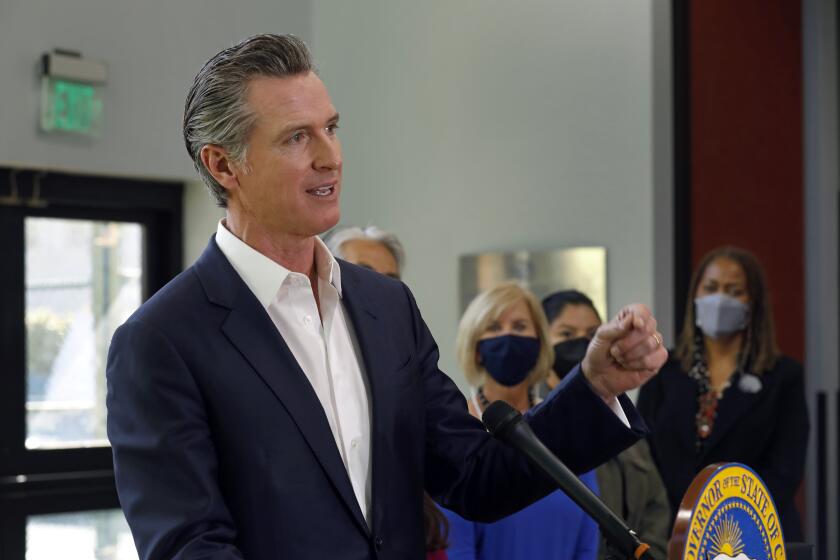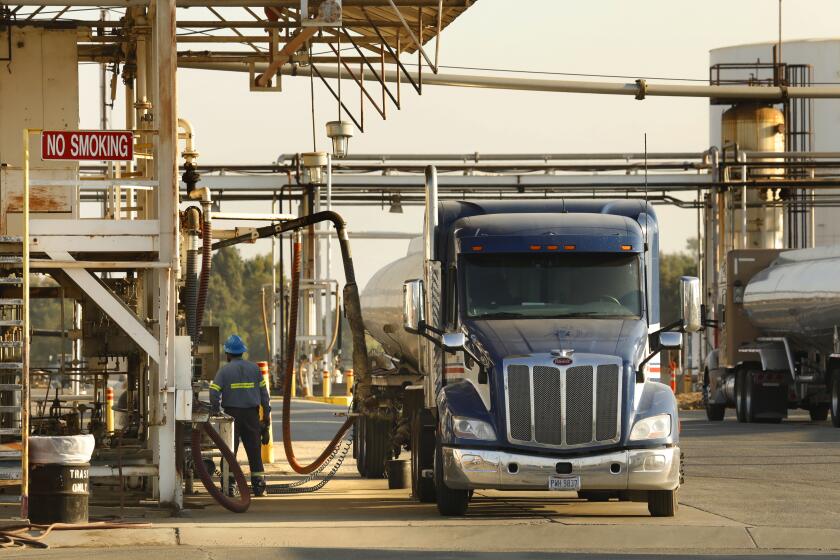Column: California’s evolution on Big Oil — in the state Capitol and my own family

- Share via
SACRAMENTO — What’s striking about passage of Gov. Gavin Newsom’s legislation to penalize Big Oil’s alleged greed is the sea change it represents in California policy.
A century ago and well past World War II, the oil industry could do no wrong in California. It was encouraged to drill, baby, drill. And this burgeoning state reaped the economic benefits.
In fact, California is still the only major oil-producing state that doesn’t impose an extraction tax for pumping the goo out of the ground. Oil companies do pay property taxes on underground reserves. But it’s a much lighter hit than an extraction tax.
In 2006, voters rejected a ballot measure that would have taxed extraction and raised $1 billion annually. The oil industry waged a $95-million opposition campaign. Three years later, the Legislature passed an extraction tax but Gov. Arnold Schwarzenegger vetoed it.
Now, California’s governor rails about “greedy” oil companies “fleecing” motorists — ”lying and gouging Californians to line their own pockets.”
The bill Newsom signed last week authorizes the California Energy Commission, which he appoints, to regulate oil refinery profits. It can establish a cap on profits and sock refineries that exceed it with what he calls a “price-gouging penalty.”
This governor brags about bringing “Big Oil to their knees.”
California Gov. Gavin Newsom launched an offensive in his war with Big Oil. The battle didn’t go as planned.
Newsom’s scorn — and the Democratic-dominated Legislature’s — is in sharp contrast to the hospitable cheering-on that the oil industry heard from Sacramento throughout most of the 20th century.
Only one Democratic lawmaker voted against Newsom’s bill and she was promptly punished by Assembly Speaker Anthony Rendon (D-Lakewood). New Assemblymember Jasmeet Bains presumably represented her oil-rich Kern County district’s views by opposing the measure. The speaker then yanked her off the influential Business and Professions Committee.
That wouldn’t have happened in the past on an anti-oil bill.
But today, bashing and voting against the oil industry apparently plays well with Democratic voters in deep blue California.
First, people are concerned about climate change and planet-altering greenhouse gas emissions spewed by gasoline automobiles.
In a poll last year by the Public Policy Institute of California, about half the people surveyed said they’d considered buying an electric vehicle. And by 3-to-1, they prioritized developing alternative energy — wind, solar, hydrogen — over expanding oil and gas production.
Second, there’s greater public angst over oil company actions that hit motorists directly. We pay far more than the national average for a gallon of gasoline — $2.61 more at one point last year when our cost at the pump exceeded $6.
Compare that with the 25 cents or so I initially paid for a gallon of gas in the 1950s when oil was a welcomed job producer in California.
Part of the difference between what we and the rest of the country pay is attributable to state and local taxes. There are also fees to fund environmental programs, mostly to fight climate change. And there’s the cost of mixing a special anti-smog blend of fuel.
But those costs don’t account for all the extra price at the pump. Now, the Energy Commission will have the legal authority to dig into refineries’ books and discover the mystery.
And maybe it can find out why just before every three-day weekend — especially during highly traveled summer months — the pump price suddenly escalates. But I think we already know that answer: Oil companies can get away with it because we need to fill up.
The California Legislature sent Gov. Gavin Newsom a bill to increase transparency in the oil industry and require refiners to report more information to the state.
Back in the day, oil played a huge role in developing California and boosting workers into the middle class.
In 1903, California became the No. 1 oil-producing state in the nation. We traded that position back and forth with Oklahoma up until the Great Depression when a glut developed because people didn’t drive so much. Oil production slowed, then escalated again during World War II. But today we’re only the seventh-largest producer of crude oil.
In the 1920s, much of the Los Angeles Basin was covered with a forest of wooden oil derricks. Many of us still remember an active oil well on the Beverly Hills High School campus. Derricks dotted the Summerland Beach area just south of Santa Barbara.
California pumped 36% of the nation’s oil in 1923. Today, 100 years later, it’s down to 3%. Those in power can hardly wait, it seems, to rid the state of its remaining production.
My own family has directly experienced the dramatic change in public policy and attitudes toward oil.
My dad left his family’s depressed Tennessee farm in the 1920s because he heard there were decent paying jobs in California’s booming oil fields. There were.
A large Skelton clan came with him — his dad, brother, two uncles and some cousins. Most went back to Tennessee farming when oil companies laid off workers during the Depression. Fortunately, my dad stayed and I was born in exquisite Santa Barbara.
With only an eighth-grade education — there was no high school near his isolated farm — Dad supported a family on an oil worker’s pay, rising through the ranks from roustabout to toolpusher and finally assistant foreman at Shell’s Ventura lease. We were proud of him.
I even became an oil worker my first summer out of high school. But I took a 33% pay cut to work for the Ventura Star-Free Press the next summer. My best investment ever.
I’ve had my own evolution on oil: Moving from strong support of offshore drilling to adamant opposition because of repeated, calamitous spills.
Today, one of my dad’s granddaughters — my daughter — is trying to rid California and the world of fossil fuel because, she believes, it threatens to destroy the planet. She’d like to eliminate her grandpa’s occupation.
She’s a Biden administration advisor trying to find clean-energy jobs for fossil-fuel workers.
Dad probably would have been fine with that, but cautioned her not to be rambunctious. Gas cars are going to be around for a while yet.
More to Read
Sign up for Essential California
The most important California stories and recommendations in your inbox every morning.
You may occasionally receive promotional content from the Los Angeles Times.













